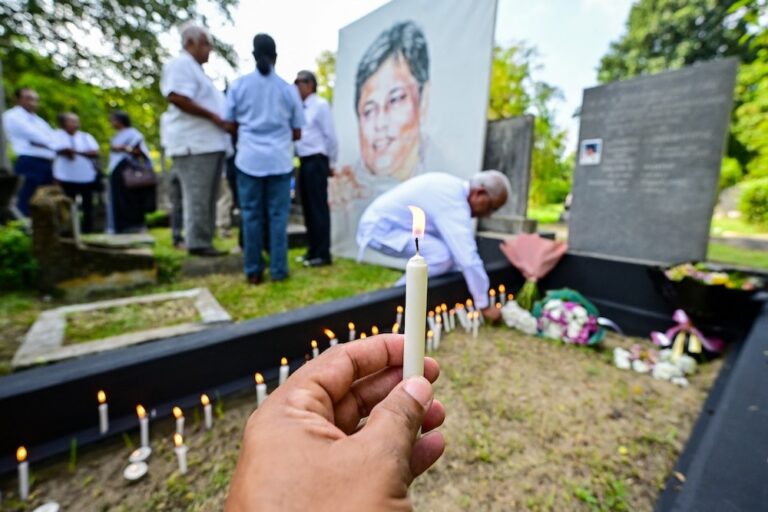RSF condemns the new forms of censorship being used to prevent diverse and freely-reported coverage of the situation in the country.
(RSF/IFEX) – 30 December 2010 – Reporters Without Borders condemns the new forms of censorship and obstruction being used by government to prevent diverse and freely-reported media coverage of the situation in Sri Lanka. The fall in the number of physical attacks, threats and cases of imprisonment is to be welcomed, but it is worrying that the authorities are blocking the return of real editorial freedom.
At the same time, the flight of at least 55 Sri Lankan journalists, including many press freedom activists, into exile during the past three years has left a void in the country’s media.
We hope the authorities will create the conditions for a lasting improvement in press freedom in 2011. This must include solving the murder of The Sunday Leader’s well-known editor, Lasantha Wickrematunge, nearly two years ago and political cartoonist Prageeth Ekneligoda’s disappearance nearly a year ago.
The latest incident was today’s ban on a visit by 10 Sri Lankan and foreign journalists, including the BBC’s correspondent, to a detention camp in Boosa to attend a meeting between prisoners and the government-created Lessons Learned and Reconciliation Commission (LLRC). The reporters had previously received permission from the LLRC and the Media Centre for National Security.
Human rights groups say there have been cases of torture and extrajudicial disappearances in the camp, which houses more than 700 suspected former members of the Tamil Tiger rebels.
BBC journalists were already prevented from attended several LLRC interview sessions with the Tamil population in September in Killinochchi, Mullaitivu and elsewhere. The BBC’s journalists were, on the other hand, able to cover the commission’s work in the north of the island in August. At the time, the Tamil daily Thinakural and the Colombo-based English-language Sunday Times published devastating accounts of cases of forced disappearances of Tamils at the end of the civil war.
As a general rule, the authorities are providing the media with no precise information about the problem of Tamil Tiger prisoners of war. The figures vary from ministry to ministry. And the press has had no access to some detainee camps.
Journalists are afraid to cover the issue of war crimes or their editors do not let them. A Colombo-based media freedom activist said: “Several journalists from English and Sinhalese-language media have been allowed to follow the LLRC’s work, but their reports do not include the most disturbing accounts of the end of the war. They have to censor themselves on the issue of war crimes.”
In another example of self-censorship, few Sri Lankan media reported the recent murder in Jaffna of an education official who had criticised the government’s decision to force Tamil children to sing the national anthem in Sinhalese.
One of the few newspapers to cover these stories, The Sunday Leader, is being subjected to various forms of harassment. Its editor, Frederica Jansz, is currently being sued by Gotabhaya Rajapaksa, one of the president’s brothers.
In 2010, the main telephone operator, Dialog, refused to transmit critical content of the government by SMS. A Colombo-based journalist said this decision forced several news websites to censor themselves in order to continue having their reports relayed by Dialog. The situation was denounced by JNW News, which provides mobile phone operators with news content.
Cases of violence have not ended altogether. Reporters for the MTV / Sirasa television station and the Lanka-e-News website were recently attacked by ruling party supporters while at Colombo airport to cover the return of the leader of the far-left NSSP party. And four journalists, including a Daily Mirror photographer, were hit by police while covering a student demonstration in the capital in mid-October.


